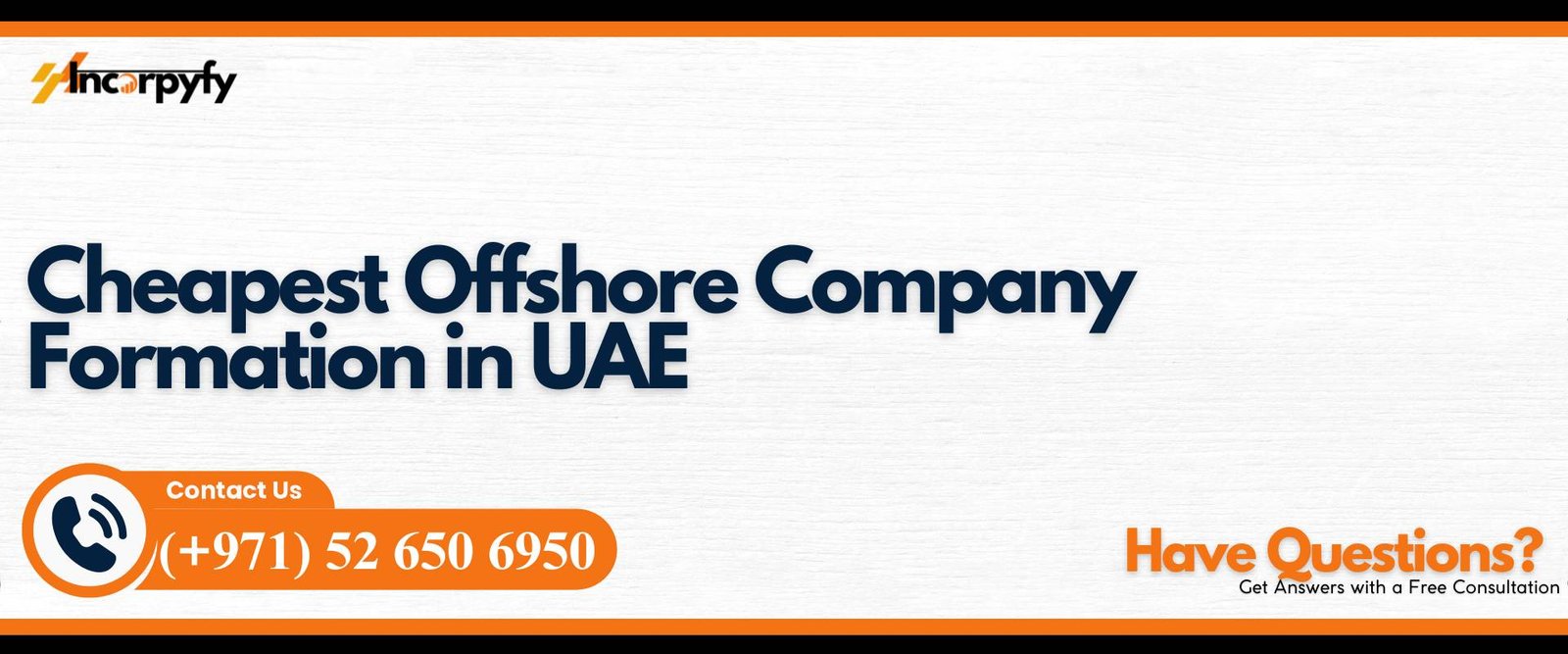
Forming an offshore company in the UAE is one of the most cost-effective ways for international investors to structure their businesses. Offshore entities are typically used for asset protection, global trading, holding intellectual property, property ownership, and tax optimization. Unlike mainland or free zone companies, offshore entities cannot do direct business within the UAE, but they remain highly attractive for investors seeking global reach.
Dubai and the wider UAE offer strategic offshore jurisdictions such as Ajman Offshore, RAK ICC, and JAFZA Offshore. These are well-regulated, affordable, and globally recognized. With fast setup timelines, 0% income tax, and 100% foreign ownership, offshore companies provide a unique balance of cost, credibility, and efficiency.
What is an Offshore Company in UAE?
An offshore company in UAE is a legal entity incorporated in a UAE jurisdiction but not permitted to conduct local business. Its purpose is primarily for international operations, wealth management, and tax-efficient structures.
Core Characteristics
- No VAT or corporate tax on non-UAE income.
- 100% foreign ownership, with no requirement for a local sponsor.
- Confidentiality with no public shareholder registry.
- Access to UAE’s banking system and global credibility.
Key Limitations
- Cannot issue UAE residence visas.
- Restricted from doing direct trade with UAE residents.
- Requires registered agents for incorporation.
Why Choose UAE for Offshore Company Formation
Dubai and the UAE are widely seen as one of the safest and most strategic offshore hubs globally. Investors are drawn by the stability, tax regime, and global accessibility offered by UAE offshore jurisdictions.
Strategic Advantages
- Global Reputation: UAE is not a “tax haven” but a respected financial hub.
- Banking Access: Offshore firms can open multi-currency accounts with UAE banks.
- Asset Protection: Ideal for high-net-worth individuals and corporations safeguarding wealth.
- Ease of Setup: Registration can take as little as 3–7 days.
Investor Appeal
Many investors use UAE offshore companies to hold real estate, intellectual property rights, or shares in other businesses, while benefiting from low costs and international credibility.
Cheapest Offshore Jurisdictions in UAE
Dubai and the UAE provide three main offshore jurisdictions, each with unique features, costs, and benefits.
Ajman Offshore Company Formation
Ajman Offshore is the cheapest offshore jurisdiction in the UAE, with setup costs starting around AED 11,500. It is popular among startups and budget-conscious investors.
Benefits: Fast incorporation, confidentiality, and very low renewal costs.
Limitations: Limited credibility with international banks compared to RAK and JAFZA.
RAK ICC Offshore Company Formation
The Ras Al Khaimah International Corporate Centre (RAK ICC) is often called the balanced option for offshore formation. Setup costs average AED 12,500 with annual renewals of AED 8,000.
Benefits: Better global recognition, access to property ownership in Dubai, and stronger compliance frameworks.
Limitations: Still no visas; requires a registered agent.
JAFZA Offshore Company Formation
Jebel Ali Free Zone Authority (JAFZA) provides the premium offshore setup, starting at AED 19,000. It is chosen by multinational corporations and high-net-worth investors.
Benefits: High credibility, global recognition, and ability to own property in Dubai.
Limitations: Higher costs and stricter compliance requirements.
Comparison of Offshore Jurisdictions
| Jurisdiction | Setup Cost | Renewal Cost | Banking Access | Property Ownership | Setup Time |
| Ajman Offshore | AED 11,500 | AED 7,500 | Limited | No | 3–5 days |
| RAK ICC Offshore | AED 12,500 | AED 8,000 | Strong | Yes | 5–7 days |
| JAFZA Offshore | AED 19,000 | AED 8,000 | Excellent | Yes | 7–10 days |
Step by Step Process for Offshore Company Formation in UAE
Setting up an offshore company in UAE is simple but must be handled through a registered agent.
Step 1: Select Jurisdiction
Choose between Ajman, RAK ICC, or JAFZA depending on your budget, property ownership needs, and banking requirements.
Step 2: Reserve Trade Name
Submit your chosen company name for approval with the offshore authority.
Step 3: Draft and Sign Legal Documents
Prepare the Memorandum of Association (MOA) and Articles of Association (AOA), defining shareholders and scope.
Step 4: Submit Documents and Pay Fees
Provide passport copies, proof of residence, and bank references with your application.
Step 5: Receive Incorporation Certificate
Once approved, you will receive your official Certificate of Incorporation.
Step 6: Open Corporate Bank Account
Establish a corporate account to handle your business transactions internationally.
Required Documents for Offshore Company Formation
- Passport copies of shareholders and directors.
- Proof of residence (utility bill, tenancy agreement).
- Bank reference letter.
- Business plan (if required).
- Memorandum and Articles of Association.
Costs of Offshore Company Formation in UAE
The cost of forming an offshore company in UAE varies:
- Ajman Offshore: Setup AED 11,500; Renewal AED 7,500.
- RAK ICC: Setup AED 12,500; Renewal AED 8,000.
- JAFZA Offshore: Setup AED 19,000; Renewal AED 8,000.
Additional costs may include:
- Bank account setup: AED 2,000–5,000.
- Document attestation: AED 500–2,000.
- Registered agent service: AED 1,500–3,000.
Benefits of Offshore Company Formation in UAE
Setting up an offshore company in the UAE offers global investors strong advantages such as 0% tax on non-UAE income, 100% foreign ownership, asset protection, confidentiality, and banking flexibility. These entities also enjoy quick registration, international credibility, and ease of managing investments, properties, or holding structures efficiently.
Tax Efficiency
Offshore companies enjoy 0% income tax on non-UAE earnings.
100% Foreign Ownership
Investors maintain complete ownership without local sponsors.
Confidentiality
No public registry of shareholders, ensuring privacy.
Asset Protection
Separate ownership shields personal and business assets.
Global Recognition
UAE offshore entities are respected worldwide.
Challenges and Considerations
While cost-effective, offshore company formation in UAE has limitations. No residence visa eligibility, banking restrictions, and inability to trade locally are major constraints. Investors must also handle annual renewals, compliance obligations, and jurisdiction-specific rules. Choosing the right offshore authority (Ajman, RAK ICC, JAFZA) helps reduce these challenges.
No Visa Eligibility
Offshore companies cannot issue UAE residence visas.
No Direct UAE Trade
These entities are restricted from doing business with UAE residents.
Banking Limitations
Some offshore entities face stricter banking requirements.
Conclusion
Forming the cheapest offshore company in UAE is an excellent option for entrepreneurs and investors who want asset protection, tax benefits, and international credibility without heavy expenses. With jurisdictions like Ajman, RAK ICC, and JAFZA, investors can select the best option for their goals and budget.
Working with business setup consultants in Dubai ensures compliance, smooth registration, and banking support.
FAQs
Where is the cheapest offshore company to operate in?
Ajman Offshore is the cheapest option, starting from AED 11,500 with renewals at AED 7,500.
Which is the cheapest free zone in UAE to open a company?
Free zones like Shams and IFZA are among the most affordable, but for offshore companies, Ajman remains the cheapest.
What is the cheapest business registration in the UAE?
Freelancer permits cost as little as AED 5,500, while Ajman Offshore is the cheapest for offshore registration.
How to set up an offshore company in UAE?
Choose a jurisdiction, appoint a registered agent, submit documents, pay fees, and receive your incorporation certificate within 3–10 days.
Which is the cheapest offshore company in UAE?
Ajman Offshore is considered the cheapest, followed by RAK ICC as a mid-tier option.
What is the difference between Freezone and offshore companies in Dubai?
Free zone companies can trade within the UAE and issue visas, while offshore companies are restricted to global operations and asset holding.
Can offshore companies own property in Dubai?
Yes, RAK ICC and JAFZA offshore companies can own property in approved areas of Dubai.
Are offshore companies in Dubai profitable?
Yes, they offer low-cost operations, tax benefits, and international banking, making them profitable for global investors.






